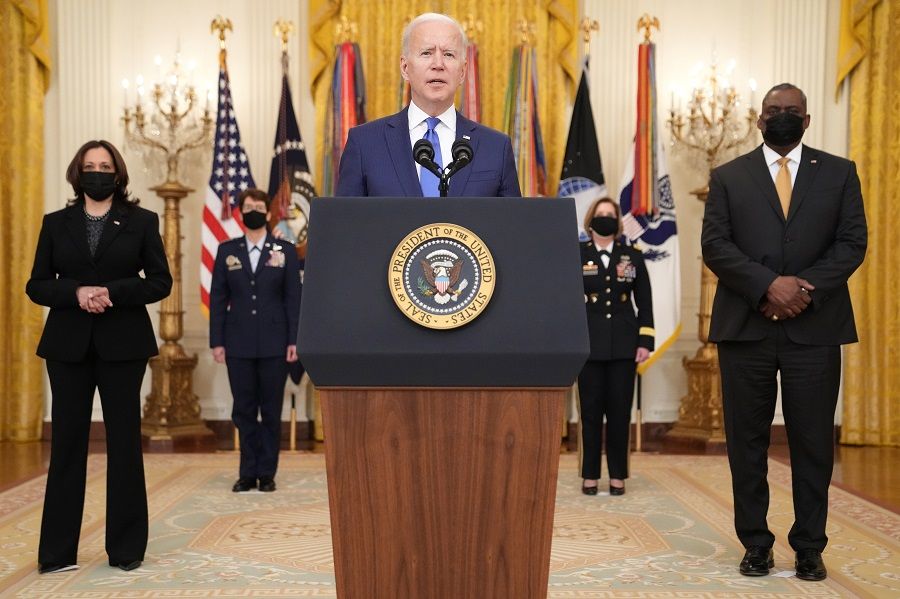Has the US walked into China's trap?

A country's foreign policy is geared towards creating a conducive international environment for a country's development and advancing its interests. It is common sense that a country's foreign policy starts with these first principles. Foreign policies that fulfil these goals are good foreign policies. Conversely, those that do not are bad ones. While the US's rationale that diplomacy is an extension of internal affairs makes some sense, diplomacy and domestic affairs are ultimately two separate issues. The goal of diplomacy is to enhance domestic development, rather than bringing domestic affairs to the international arena. But the US is an exception.
Following the end of World War II in 1945, the US's GDP accounted for 50% of the world's GDP. It possessed 75% of the world's gold, and controlled international organisations such as the United Nations. Virtually all countries had to look up to the US.
Common needs, common sense
Today's America is a far cry from its glory days. It is currently the world's largest debtor nation and its position in the world is on a steep decline. The country is problem-ridden, the people's mindsets have drastically changed, and society is in turmoil. The repeated failures of US foreign policy have played a part in landing the US in its current state.
Americans consider international politics as lofty politics reserved for the upper class, or in other words, an arena where the common people have no say. In 2015, I went to Washington with some students to settle visa application matters. I spoke with a Vietnam War veteran outside the White House and said that the US is in decline because of its foreign policy and its excessive deployment of its military. He fully agreed with me and asked me to head into the White House and tell it to then-US President Barack Obama. He said that they would not listen to the general public but they might listen to a professor. If only it was that simple.
When the Chinese say that the elites will be the downfall of a country, they are referring to the fact that the elites do not understand the struggles and pains of the common people.
In the 1970s, I came across this line when reading the Selected Works of Mao Zedong: "The noblest are the most foolish while the lowliest are the smartest (高贵者最愚蠢,卑贱者最聪明)." I did not understand it at the time. The elites come from impressive backgrounds, have high qualifications, and read books and newspapers every day. How can they be the most foolish? The lowliest people like my parents have never gone to school and labour day in, day out just to survive. How are they the smartest? I did not understand this at all - not until 30 years later when I was watching television at home in the US. George H. W. Bush was at a campaign rally in Washington and it had been widely reported that he was amazed by checkout scanners at the supermarket and how the price of the items could be registered on the cash register screen - it turned out that he was amazed by something so common to everyday people! The noble are the most foolish because of their lack of common sense. The lowliest are smartest because of what they have learnt through hard work and constant labour.

When the Chinese say that the elites will be the downfall of a country, they are referring to the fact that the elites do not understand the struggles and pains of the common people. During the Second World War, the US was the only major country that was left undamaged and even flourished. But it intervened in China's domestic affairs and placed its bet on Chiang Kai-shek. Even after its failure, it did not learn its lesson and continued to intervene in North Korea's civil war, in Taiwan, and in China's domestic affairs. After it failed in North Korea, it intervened in Vietnam's civil war for a period of ten years, and failed again.
The most powerful military power in history actually lost to a Vietnam that was still in an agriculture era. The nation's hard-earned wealth that could have been spent on improving people's lives and the country's infrastructure was instead wasted on a meaningless war and plagued the US public with the "Vietnam Syndrome" of being averse to getting involved in overseas conflicts. However, it did not stop there. Between them, the George Bush father and son had invaded Iraq twice. Bush Senior banded together with his allies and defeated Saddam Hussein. After Bush Junior became president, he felt that it was not enough, and invaded Iraq again. My teachers and friends asked for my thoughts on these events when I was studying in the US. I said that the US would fall in the long run. They did not agree and we did not come to a conclusion. I will let history speak for itself.
The US has established military bases in more than 120 countries around the world and its military expenditure equals that of ten other major countries with high military spending put together. This is an unbearable burden for any country on the globe. It is only a matter of time before it collapses.
The US will exhaust its might if it does business as usual
Anyone who knows anything about dialectics would understand that the US's strength is nothing more than a moment's courage - as long as the opponent keeps resisting, the US would be done for. The US has gained nothing from the Iraq War and Afghan War; instead it has only suffered major blows. The days when imperialism and colonialism conquered the world through guns and cannons are long gone. Former colonies now have their own guns and cannons. Although these weapons are not as advanced as those of the US, they are lethal enough to kill. Western elites in the US and other countries fail to recognise that times have changed and are still of the thinking that they can maintain hegemony by force. This strongly goes against the tide of history. The US has established military bases in more than 120 countries around the world and its military expenditure equals that of ten other major countries with high military spending put together. This is an unbearable burden for any country on the globe. It is only a matter of time before it collapses.

The new Biden administration is continuing with the US's usual policies. It is joining forces with its allies in freedom of navigation operations in the South China Sea, constantly passing through the Taiwan Strait, and challenging China's sovereignty. While these actions do not cause actual harm to China, it is as if the US has walked into China's trap; China has ample time to watch and wait as the US slowly exhausts its power. In fact, the provocative actions of the US and its allies in Hong Kong and Xinjiang bring no real benefit to themselves but instead only serve to irk the Chinese people and the Chinese government. Although American elites have repeatedly said that they want to delink the Chinese Communist Party and the Chinese people, their attempts at challenging China's territorial sovereignty only bolsters nationalistic sentiments among the Chinese and their support for their government's counter-attacks against Western provocation. This is a classic example of diplomacy that "drives the fish into deep waters and the sparrows into the thickets", or driving those who could have been of help to the enemy's side. If the US carries on with this in the long run, how can it not fail?
To top it off, recently, a US military official has been urging his country to consider the "real possibility that a nuclear crisis with Russia or China could escalate quickly to a conflict involving nuclear weapons". This is not only an open challenge to both China and Russia but also a threat to all mankind. Amid problems such as global warming and climate change that are already threatening human survival today, we can be certain that such talk would infuriate all the peace-loving people in the world, including those in the US.
Related: Internal conflicts will be the downfall of the US | America has itself to blame for its decline | America's flawed democracy: When power and cognitive abilities of the people fail to match | What can we expect from Biden's 'approach of patience' towards US-China relations | The US is helping to unite the Chinese people and the CCP by challenging China's core interests
